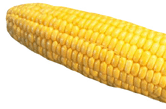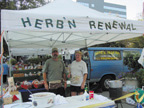Slow Food
Simmering Down
By Rhonda Reeves
 More and more consumers are becoming aware that our supposed abundance of cheap and healthful food is to a considerable extent illusory. They are beginning to see that the social, ecological and even economic costs of such 'cheap food' are in fact, great.
More and more consumers are becoming aware that our supposed abundance of cheap and healthful food is to a considerable extent illusory. They are beginning to see that the social, ecological and even economic costs of such 'cheap food' are in fact, great.
-Wendell Berry, Another Turn of the Crank
"Fast food" is usually neither.
Anybody who shows up at the closest drive-thru expecting to save time or money is kidding themselves (especially if you factor in the subsequent line you'll stand in at the drugstore when you show up to buy Maalox).
And the over-processed, over-packaged "convenience" foods that line the grocery store shelves are just as misleading.
Factory farming, while prolific and seemingly unstoppable, is unacceptable as a primary food source. The health ramifications are endless. And the cruelty of the industry would give even the most carnivorous conservative karmic pause when it comes to the prospect of ingesting the misery of factory-farmed animals.
As activist Vandana Shiva argues in Stolen Harvest, the "McDonaldization" of world food "attempts to create a uniform food culture of hamburgers. The mad-cow-disease epidemic tells us something of the costs hidden in this food culture and food economy."
Even the most hardened capitalists are beginning to recognize that enlightened self-interest tells us we need to encourage a food supply that, at a bare minimum, doesn't poison us. And if such a movement satisfies an epicurean palate along the way, so much the better.
With the success of Lexington's Farmers' Market, a proliferation of backyard gardening, and a diversity of grass-roots groups supporting sustainable agriculture, it seems like the Bluegrass has been participating in the Slow Food movement for years-long before there were books on the topic suggesting Italian origins.
Isolated Appalachians and other rural communities, in particular, grew and consumed their own food supplies for many generations-with little access or resources to participate in McDonaldization. (Though that's certainly changed in recent decades with the proliferation of a Wal-Mart on every corner.)
 Karin and Drew Rasmussen grow the herbs for their Herb'n Renewal venture and have been familiar faces at Lexington's Farmers' Market for many years. Karin says of the Market, "it embodies the 'slow food' movement. A walk through the Saturday market on Vine is enough to convince the doubters. Local farmers grow everything from Asparagus to Zucchini and harvest them fresh from their farms to the market so you can enjoy the homegrown quality that the 'slow food' movement stands for."
Karin and Drew Rasmussen grow the herbs for their Herb'n Renewal venture and have been familiar faces at Lexington's Farmers' Market for many years. Karin says of the Market, "it embodies the 'slow food' movement. A walk through the Saturday market on Vine is enough to convince the doubters. Local farmers grow everything from Asparagus to Zucchini and harvest them fresh from their farms to the market so you can enjoy the homegrown quality that the 'slow food' movement stands for."
She advises, "When you stop at a booth, ask a question about a certain vegetable; you'll get a straight answer from the farmer."
As the market has expanded annually (far beyond corn and beans, though those are in abundance), she points out that "the variety of items available at the market are sure to convince you that going back to the basics is the way to go."
Her husband Drew concurs, adding "We've been practicing 'slow food' for years and didn't know it! Our herb seasoning blends are created to enhance, not mask the natural flavor of food. Every batch is hand blended; this way we can ensure the freshness and quality that you don't find on grocery store shelves."
There is nothing elitist about Farmers' Market (despite the proliferation of SUVs you'll find circling the block on Tuesdays, Thursdays and Saturdays). The market is within easy walking distance of some of the city's poorest urban neighborhoods, and the produce is far more affordable than the processed junk found in many corner markets (which accept food stamps; inflate prices; and exploit low-income clientele).
Many local restaurants have taken the lead in incorporating locally-grown produce into their menus whenever possible, and usually prominently promote this with their patrons. Supporting their initiative with your dining dollars positively reinforces them economically.
On the other hand, if you're served a tomato in July with all the taste and consistency of polyurethane, ask the proprietors if they've considered using local produce.
Bruce Burris spearheads Radical BUGS (Back Urban Garden Spaces) in downtown Lexington. He asks, "what is slow food? I left San Francisco ten years ago and I don't remember hearing anything about any Slow Food, then I find out Slow Food is from Italy, so naturally I'm a little suspicious. But if Slow Food is only the opposite of Fast Food then frankly that is good enough for me-everything else is icing on the carrot cake. Count me in, sign me up, I'm on the 'Slow Food' bandwagon!"
As for the larger implications of the movement, Burris asks, "How on earth did we get to the point where it seems a radical notion to create a community garden-and why on the other hand does it seem completely natural, reassuring even, to see trucks from lawn care companies spewing fungicides, pesticides, and other toxins onto suburban lawns that empty directly into our very own reservoirs? Those tiny flags which employees place in the ground (to be honest, they are bright and decorative) warning dogs to evacuate the area for 24 hours (human time), are not entirely reassuring to me-one, because I don't believe that 24 hours is enough time for all those toxins to entirely drain from the lawn and into our watershed and two, because the squirrels and babies in my neighborhood are not too good at reading the writing on those little flags. (That last line sounds uneasily familiar; hope I'm not plagiarizing here?)"
Martin Richards is a member of the Community Farm Alliance. CFA is a statewide grassroots organization of persons committed to family-scale farming as the most efficient and sustainable form of producing the best quality food, while protecting the environment and strengthening rural community life.
Richards has high hopes for Kentucky's ability to create a sustainable food economy: "The future of Kentucky agriculture lies in the ability of farmers and rural communities to diversify their crops and still maintain their community identities. It seems only natural that Kentucky farmers should take their handmade approach to tobacco and apply it to food. And because agriculture, tobacco specifically, has been an important part of the state's economy, the support of urban communities for a local food economy is critical."
He suggests we draw on the experience of the tobacco farmers, and the strengths that we can take from their approach, "Because of the 'handmade' nature of producing burley tobacco, Kentucky farmers, their families and their communities have long experienced an intimate relationship with the land, what it produces and what it means for a community to be connected to a crop. This community-scale agriculture, still practiced throughout Kentucky, has shaped the 'main street economies' of 118 counties and their rural communities.
"Community Farm Alliance believes that this 'community scale' agriculture is still the most effective and sustainable approach to producing vibrant rural and urban community economies and diversified natural and social environments. It is for this reason that CFA entered the new millennium with the goal of creating a local food economy in Kentucky."
Recognizing the need to make locally-grown food available to the entire community, Martin says CFA is working "to help an underserved neighborhood in Louisville open a new farmers' market-the first in the Kentucky set up to take EBT cards. We believe fresh, healthy local food should be available to all consumers, and we are hoping this market will serve as a model for other urban areas." This model market is scheduled to open Saturday, July 21st. CFA believes the opportunities in this market are vital, as they "represent an economic development initiative in the inner-city; and create new market potentials for farmers."
Martin stresses if we are to achieve a "vision of a locally integrated food and farm economy, there is a need to build connections between urban and rural people."
That's one of many great places to start.
HOME | THIS ISSUE | ACE ARCHIVES